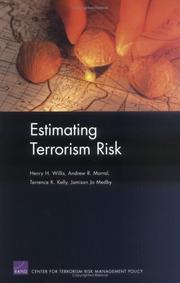| Listing 1 - 8 of 8 |
Sort by
|
Book
ISBN: 9780833086365 0833086367 0833086197 9780833086198 Year: 2014 Publisher: Santa Monica, California : RAND Corporation,
Abstract | Keywords | Export | Availability | Bookmark
 Loading...
Loading...Choose an application
- Reference Manager
- EndNote
- RefWorks (Direct export to RefWorks)
Terrorism insurance --- Terrorism risk assessment --- United States.
Book
Year: 2007 Publisher: Santa Monica, CA : RAND Corporation,
Abstract | Keywords | Export | Availability | Bookmark
 Loading...
Loading...Choose an application
- Reference Manager
- EndNote
- RefWorks (Direct export to RefWorks)
The Department of Homeland Security (DHS) has adopted a focused approach to risk reduction. DHS is moving increasingly to risk analysis and risk-based resource allocation, a process that is designed to manage the greatest risks instead of attempting to protect everything. This report applies a probabilistic terrorism model that is broadly applied in the insurance industry to assess risk across cities, to assess risks within specific cities, and to assist intelligence analysis. Among the authors' conclusions: Terrorism risk is concentrated in a small number of cities, with most cities having negligible relative risk, so terrorism estimates such as those described in the report should be incorporated into the grant allocation assessment process. DHS should consider funding the development of city profiles of major metropolitan areas receiving DHS preparedness grants. It should also develop descriptions of terrorist attack planning and operations that can be used to translate estimates from risk models of likely attack scenarios into detailed recommendations. Finally, DHS should develop tabletop exercises to test the scenarios and provide feedback.
Terrorism risk assessment --- Cities and towns --- Terrorism --- Prevention. --- Prevention --- Research.
Book
ISBN: 661207048X 1282070487 9786612070488 1441605398 6000012403 160750362X 9781441605399 9781607503620 1586038982 9781586038984 9781586038984 9781282070486 9786000012403 Year: 2008 Publisher: Amsterdam IOS Press
Abstract | Keywords | Export | Availability | Bookmark
 Loading...
Loading...Choose an application
- Reference Manager
- EndNote
- RefWorks (Direct export to RefWorks)
The real power for security applications will come from the synergy of academic and commercial research focusing on the specific issue of security. This book is suitable for those interested in understanding the techniques for handling very large data sets and how to apply them in conjunction for solving security issues.
Data mining --- Computer algorithms --- Terrorism --- Terrorism risk assessment --- Prevention --- Data sets --- Security informatics --- NATO

ISBN: 0415443245 0203927702 9780414443234 9780415443241 9780203927700 9780415443234 9781134068319 9781134068357 9781134068364 Year: 2008 Publisher: Abingdon: Routledge,
Abstract | Keywords | Export | Availability | Bookmark
 Loading...
Loading...Choose an application
- Reference Manager
- EndNote
- RefWorks (Direct export to RefWorks)
This book offers the first comprehensive and critical investigation of the specific modes of risk calculation that are emerging in the so-called War on Terror.Risk and the War on Terror offers an interdisciplinary set of contributions which debate and analyze both the empirical manifestations of risk in the War on Terror and their theoretical implications. From border controls and biometrics to financial targeting and policing practice, the imperative to deploy public and private data in order to ‘connect the dots’ of terrorism risk raises important questions for social scientists and practitioners alike.How are risk technologies redeployed from commercial, environmental and policing domains to the domain of the War on Terror?How can the invocation of risk in the War on Terror be understood conceptually?Do these moves embody transformations from sovereignty to governmentality; from discipline to risk; from geopolitics to biopolitics?What are the implications of such moves for the populations that come to be designated as ‘risky’ or ‘at risk’?Where are the gaps, ambiguities and potential resistances to these practices?In contrast with previous historical moments of risk measurement, governing by risk in the War on Terror has taken on a distinctive orientation to an uncertain future. This book will be of strong interest to students and researchers of international studies, political science, geography, legal studies, criminology and sociology.
Terrorism --- Privacy, Right of --- Ports of entry --- Prevention --- Risk assessment --- Security measures --- Terrorism risk assessment --- Privacy, Right of. --- 811 Filosofie --- 852 Internationale conflicten --- Invasion of privacy --- Right of privacy --- Civil rights --- Libel and slander --- Personality (Law) --- Press law --- Computer crimes --- Confidential communications --- Data protection --- Right to be forgotten --- Secrecy --- Anti-terrorism --- Antiterrorism --- Counter-terrorism --- Counterterrorism --- Prevention. --- Law and legislation --- Acts of terrorism --- Attacks, Terrorist --- Global terrorism --- International terrorism --- Political terrorism --- Terror attacks --- Terrorist acts --- Terrorist attacks --- World terrorism --- Direct action --- Insurgency --- Political crimes and offenses --- Subversive activities --- Political violence --- Terror --- Terrorism - United States - Prevention --- Terrorism - Risk assessment - United States --- Privacy, Right of - United States --- Ports of entry - Security measures - United States --- Terrorism - Prevention

ISBN: 0415946417 0415946425 9780415946421 Year: 2003 Publisher: New York : Routledge,
Abstract | Keywords | Export | Availability | Bookmark
 Loading...
Loading...Choose an application
- Reference Manager
- EndNote
- RefWorks (Direct export to RefWorks)
Undertaken as part of the National Science Foundation's call for research associated with the 9/11 terrorist attacks, this volume contains research that addresses the immediate role and utility of geographical information and technologies in emergency management. It also initiates an on-going process to help develop a focused national research agenda on the geographical dimensions of terrorism. Areas covered include: geospatial data and technologies infrastructure research, root causes of terrorism, and vulnerability science and hazard research.
Terrorism. --- Terrorism --- Geography. --- Geographic information systems. --- Emergency management. --- Risk assessment. --- Terrorisme --- Géographie --- Systèmes d'information géographique --- Gestion des situations d'urgence --- Evaluation du risque --- Prevention. --- Prévention --- Geography --- Terrorism risk assessment. --- Geografie --- Sociale geografie --- Politieke Geografie. --- Géographie --- Systèmes d'information géographique --- Prévention --- Terrorisme. --- Lutte contre --- Évaluation du risque. --- Évaluation du risque.

ISBN: 0833040936 0833038346 9780833040930 9780833038340 9780833040886 083304088X Year: 2005 Publisher: Santa Monica, CA : RAND,
Abstract | Keywords | Export | Availability | Bookmark
 Loading...
Loading...Choose an application
- Reference Manager
- EndNote
- RefWorks (Direct export to RefWorks)
This monograph provides a practical definition of terrorism risk, presents a method of estimating it, and demonstrates a framework for evaluating this method. Results support conclusions on how to improve risk-based resource allocation.
Federal aid to terrorism prevention -- United States -- Planning. --- Terrorism -- Prevention. --- Terrorism -- United States -- Prevention. --- Terrorism risk assessment -- United States. --- Terrorism --- Federal aid to terrorism prevention --- Prevention. --- Risk assessment --- Planning. --- Acts of terrorism --- Attacks, Terrorist --- Global terrorism --- International terrorism --- Political terrorism --- Terror attacks --- Terrorist acts --- Terrorist attacks --- World terrorism --- Prevention --- Federal aid --- Direct action --- Insurgency --- Political crimes and offenses --- Subversive activities --- Political violence --- Terror --- Finance

ISBN: 083304088X 0833038087 9780833040886 9780833038081 9780833041135 0833041134 0833038273 9780833038272 9780833041067 0833041061 Year: 2005 Publisher: Santa Monica, CA : Rand, Project Air Force,
Abstract | Keywords | Export | Availability | Bookmark
 Loading...
Loading...Choose an application
- Reference Manager
- EndNote
- RefWorks (Direct export to RefWorks)
An overview of higher-level decisionmaking and modern methods to improve decision support
Decision support systems. --- Military planning -- United States -- Decision making -- Data processing. --- United States. Air Force -- Research. --- Terrorism --- Terrorism risk assessment --- Federal aid to terrorism prevention --- Criminology, Penology & Juvenile Delinquency --- Social Welfare & Social Work --- Social Sciences --- Prevention --- Planning --- Military planning --- Decision making --- Data processing. --- United States. --- Research. --- War planning --- AF --- Air Force (U.S.) --- U.S.A.F. --- United States Air Force --- US Air Force --- USAF --- Management information systems --- Telematics --- Military administration --- Military policy --- AF (Air force) --- U.S.A.F. (Air force) --- USAF (Air force) --- Diseases --- Public health --- Reporting. --- Information services.
Book
ISBN: 0833040316 9786611181246 1281181242 0833042858 9780833042859 9780833040312 9781281181244 6611181245 Year: 2006 Publisher: Santa Monica, CA : Rand Homeland Security,
Abstract | Keywords | Export | Availability | Bookmark
 Loading...
Loading...Choose an application
- Reference Manager
- EndNote
- RefWorks (Direct export to RefWorks)
How much data regarding U.S. anti- and counterterrorism systems, countermeasures, and defenses is publicly available and how easily could it be found by individuals seeking to harm U.S. domestic interests? The authors developed a framework to guide assessments of the availability of such information for planning attacks on the U.S. air, rail, and sea transportation infrastructure, and applied the framework in an information-gathering exercise that used several attack scenarios. Overall, the framework was useful for assessing what kind of information would be easy or hard for potential attacker
Terrorism --- Terrorism risk assessment --- Transportation --- Infrastructure (Economics) --- National security --- Prevention --- Evaluation. --- Effect of terrorism on --- Security measures --- Safety measures. --- Planning. --- National security policy --- NSP (National security policy) --- Security policy, National --- Capital, Social (Economics) --- Economic infrastructure --- Social capital (Economics) --- Social infrastructure --- Social overhead capital --- Public transportation --- Transport --- Transportation, Primitive --- Transportation companies --- Transportation industry --- Acts of terrorism --- Attacks, Terrorist --- Global terrorism --- International terrorism --- Political terrorism --- Terror attacks --- Terrorist acts --- Terrorist attacks --- World terrorism --- Government policy --- Economic aspects --- Economic policy --- International relations --- Military policy --- Economic development --- Human settlements --- Public goods --- Public works --- Capital --- Locomotion --- Commerce --- Communication and traffic --- Storage and moving trade --- Direct action --- Insurgency --- Political crimes and offenses --- Subversive activities --- Political violence --- Terror
| Listing 1 - 8 of 8 |
Sort by
|

 Search
Search Feedback
Feedback About UniCat
About UniCat  Help
Help News
News